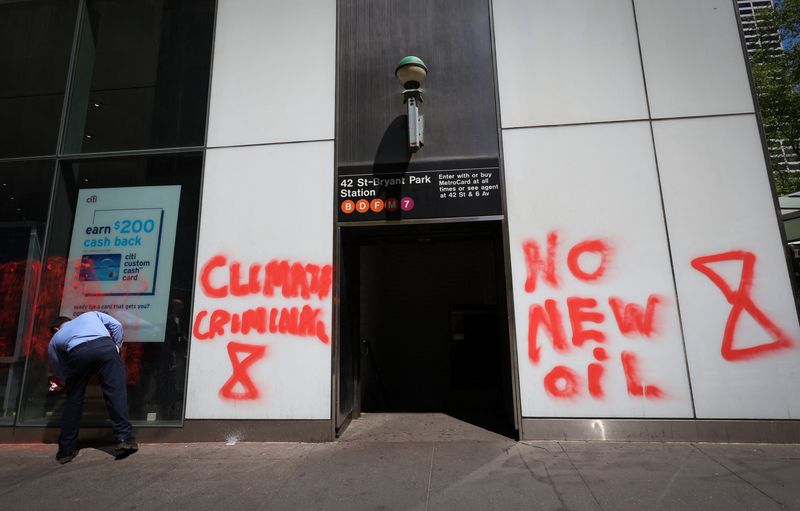By Tatiana Bautzer
NEW YORK (Reuters) -Climate protesters spray painted graffiti on Citigroup Inc (NYSE:C) and Bank of America Corp (NYSE:BAC). offices in New York's Bryant Park on Monday, accusing the banks of being "climate criminals" a day before the lenders are scheduled to hold their annual shareholder meetings.
"The largest banks in the world invest hundreds of billions of dollars in new fossil fuel infrastructure," said Jim Gordon, one of the protesters outside the Citigroup office in midtown Manhattan. "I'm not generally a person that likes to go out in the street and do things like this, but I have grandkids and I'm terrified for their future," Gordon said.
Behind Gordon, a Citigroup employee cleaned windows sprayed with messages, including "Climate criminal" and "Save the Amazon (NASDAQ:AMZN)."
"Citi respects the advocacy of climate activists and their right to protest. We recognize the importance of transitioning to a low-carbon economy. That's why we're investing in clean energy solutions through our net zero commitments and our $1 trillion commitment to sustainable finance", the bank said in a statement. The bank also added that it keeps working with fossil fuel clients to support efforts to decarbonize their businesses. "Our approach reflects the need to transition while also continuing to meet global energy needs".
In a message to shareholders preparatory to the assembly tomorrow, Citi management explains the environmental policies it has been adopting.
The protesters represented groups that included Climate Organizing Hub, Extinction Rebellion, Green Faith, Oil and Gas Network and Stop the Money Pipeline.
They planned protests at the headquarters of the biggest U.S. banks on Monday before their annual general meetings on Tuesday, including Citigroup in New York, Bank of America in Charlotte, North Carolina and Wells Fargo (NYSE:WFC) in San Francisco.
They also intend to target JPMorgan Chase & Co (NYSE:JPM)'s annual meeting.
Pressure has been building on major U.S. banks to commit to stopping funding for new fossil fuel projects. The actions outside the biggest U.S. banks will mirror several shareholder resolutions urging banks to phase out funding for new oil, gas, and coal development.

Some global lenders have changed their policies: HSBC in December announced it was ending funding for new fossil fuel projects, while Danske Bank this year said it would stop financing oil and gas projects and corporate financing.
U.S. banking giant CEOs serve as prominent representatives of the business community. Lenders have come under increasing scrutiny for their stances on environmental, social and governance (ESG) considerations from groups across the political spectrum.